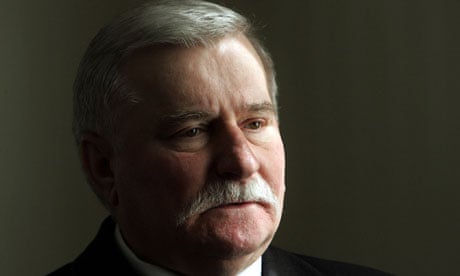A national committee devoted to fighting hate speech and other crimes in Poland has filed a complaint with prosecutors in Gdansk accusing Lech Walesa of promoting a "propaganda of hate against a sexual minority", after the Nobel peace prize-winner said gay people had no right to a prominent role in politics.
Walesa said in a television interview on Friday that he believed gay people had no right to sit on the front benches in parliament and, if there at all, should sit in the back "or even behind a wall".
"They have to know that they are a minority and adjust to smaller things, and not rise to the greatest heights," he told the private broadcaster TVN during a discussion of gay rights. "A minority should not impose itself on the majority."
Walesa, Poland's first democratic-era president, is a deeply conservative Roman Catholic and a father of eight who has never advocated progressive social views. The democracy he helped create in 1989 from the turmoil of strikes and other protests has, however, been undergoing a profound social transformation in recent years.
A key symbol of the change is a new willingness to tackle gay rights, long a taboo subject. In 2011, voters elected Poland's first openly gay and first transsexual members of parliament.
Walesa is no longer active in Polish political life, though he is often interviewed and asked his opinion on current affairs, as on Friday when he was asked about his views on civil partnerships and a new public gay rights campaign. Much of his time is spent giving lectures internationally on his role in fighting communism and on issues of peace and democracy.
Jerzy Wenderlich, a deputy speaker of parliament with the Democratic Left Alliance, said: "From a human point of view his language was appalling. It was the statement of a troglodyte. Now nobody in their right mind will invite Lech Walesa as a moral authority, knowing what he said."
Some said they were not surprised by Walesa's words. "I am surprised that only now we are noticing that Walesa is not in control of what he says and that he has views that are far from being politically correct," said Adam Bielan, a conservative Polish member of the European parliament.

Comments (…)
Sign in or create your Guardian account to join the discussion